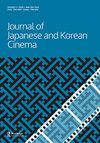Nakae Yúji的《Panari nite》(1986)中的景观与表现危机
引用次数: 0
摘要
在日本,景观的意识形态含义在20世纪70年代被热烈讨论。电影学者和评论家重彦Hasumi Shigehiko在回应这一讨论时,将“景观”描述为一种文化装置,它决定了人们对物质世界的感知。类似的景观观可以在Panari nite (on an Offshore Island, Nakae Yūji, 1986)中找到,它通过描绘文森特·梵高在阿尔勒的神话生活,证明了对景观的批判性参与。就像这位荷兰艺术家在法国南部寻找想象中的日本一样,影片的主角,一位来自东京的画家,带着他的幻想来到了亚热带冲绳的一个岛屿,在那里他面对现实与表现之间的巨大差距。通过对这部电影的分析,我将评估桥美对中井的形成影响,认为这部电影采用了桥美对景观的批判方法,以对抗冲绳作为日本国界内的异国他乡的主流刻板印象。本文章由计算机程序翻译,如有差异,请以英文原文为准。
Landscape and the crisis of representation in Nakae Yūji’s Panari nite (1986)
ABSTRACT In Japan, the ideological implications of landscape were hotly discussed throughout the 1970s. In his response to this discussion, the film scholar and critic Hasumi Shigehiko characterized ‘landscape’ as a cultural apparatus that dictates one’s perception of the physical world. A comparable view on landscape can be found in Panari nite (On an Offshore Island, Nakae Yūji, 1986), which evinces a critical engagement with landscape through drawing on the mythologized life of Vincent van Gogh in Arles. As with the Dutch artist, who sought an imagined Japan in southern France, the film’s protagonist, a painter from Tokyo, carries along his fantasies when he comes to an island in subtropical Okinawa, where he confronts the devastating gap between reality and representation. Through analysis of the film, I will assess Hasumi’s formative influence upon Nakae, arguing that the film employs Hasumi’s critical approach to landscape in order to counter the dominant stereotype of Okinawa as an exotic Other within Japan’s national boundary.
求助全文
通过发布文献求助,成功后即可免费获取论文全文。
去求助
来源期刊

Journal of Japanese and Korean Cinema
Arts and Humanities-Visual Arts and Performing Arts
CiteScore
0.60
自引率
0.00%
发文量
16
期刊介绍:
Journal of Japanese and Korean Cinema is a fully refereed forum for the dissemination of scholarly work devoted to the cinemas of Japan and Korea and the interactions and relations between them. The increasingly transnational status of Japanese and Korean cinema underlines the need to deepen our understanding of this ever more globalized film-making region. Journal of Japanese and Korean Cinema is a peer-reviewed journal. The peer review process is double blind. Detailed Instructions for Authors can be found here.
 求助内容:
求助内容: 应助结果提醒方式:
应助结果提醒方式:


